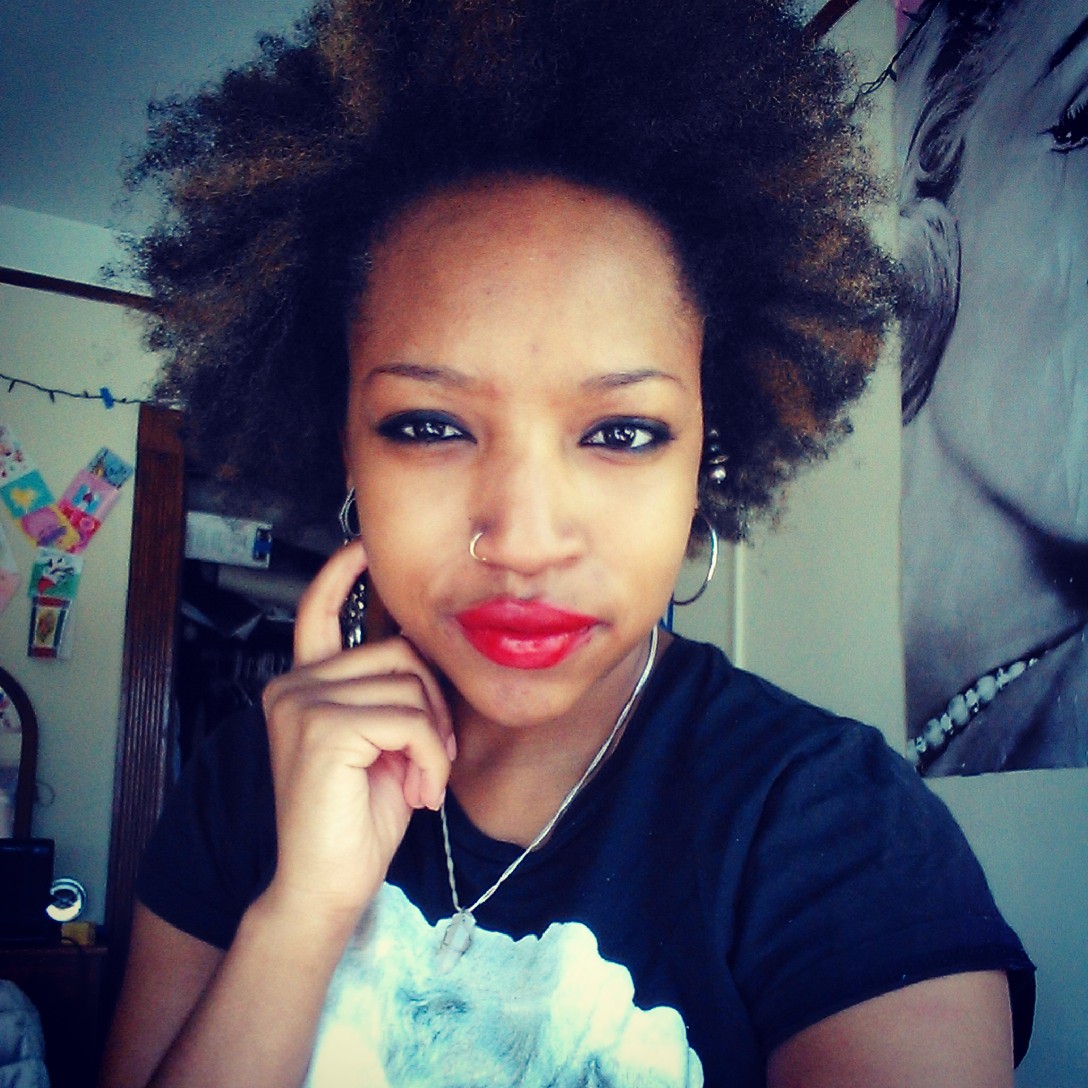
by Deva Jones | Oct 10, 2014 | Economic Justice, Internship, Young Adult
This post was written by Renee Bryant, a participant in the Global Justice Summer Internships.
Working with Jose Oliva this summer at the Food Chain Worker’s Alliance (FCWA) allowed me the opportunity to reflect on my previous experience as a black woman in the food industry and study more about food justice overall. Jose is a Latino male and has worked in the food industry in the past. His experience is what drives him and gives him a passion to highlight the injustice, specifically in the form of pay that workers in the food industry receive. Women and racial minorities are consistently at the bottom of the totem pole when it comes to food industry justice because they are often in positions where they can be taken advantage of due to the hierarchies and systems our society sustains to keep those groups at the bottom. From working with Jose, I learned that these people often cannot afford an education and are stuck working dead-end food jobs where they get paid little and work long hours. Over time it becomes a cycle and these people get stuck in sometimes multiple food jobs struggling to make ends meet while the companies they work for make billions.
I could identify with the little pay and exhausting work due to my experience working at McDonald’s one summer. The summer after my freshman year of college I had not gotten any internship offers so I took a job at my local McDonald’s as an overnight crew-member. I do not come from a privileged background and I needed money for books and other expenses since Vassar is not exactly a cheap school. I worked four or five nights a week and made $7.25 an hour. My duties included cleaning the restaurant, taking orders, cashier, and stock for the next day. By the time 6 a.m. rolled around my feet would be sore, I was annoyed from being sexually harassed by customers and coworkers all night, and sad I was missing the summer fun all my friends were having. When I would turn in my drawer, I would notice how much money the restaurant was making and compared that to how little I was receiving in my paycheck.
Fortunately for me, the job was only temporary and I was able to return to school and move on. Some of my coworkers did not have the privilege of a short experience and for them McDonald’s was their sole income. I could not imagine trying to raise a family or live on my own on the wages a McDonald’s salary provides because the money I made during the summer barely covered the cost for my books and incidentals for the first semester. In some ways feel like there is some disconnect from me and the other employees despite the fact that I am a woman of color and a lot of my coworkers fit into that demographic. I at least had the luxury of moving on to work on my education while others could not even afford community college. Pairing my experience at McDonald’s and my experience at FCWA has shown me that everyone deserves to get paid a fare wage whether they are only a college kid making summer money or a single mom with a teenage son. The lesson I learned this summer at FCWA was that every job and every worker is worth more than companies are willing to admit.
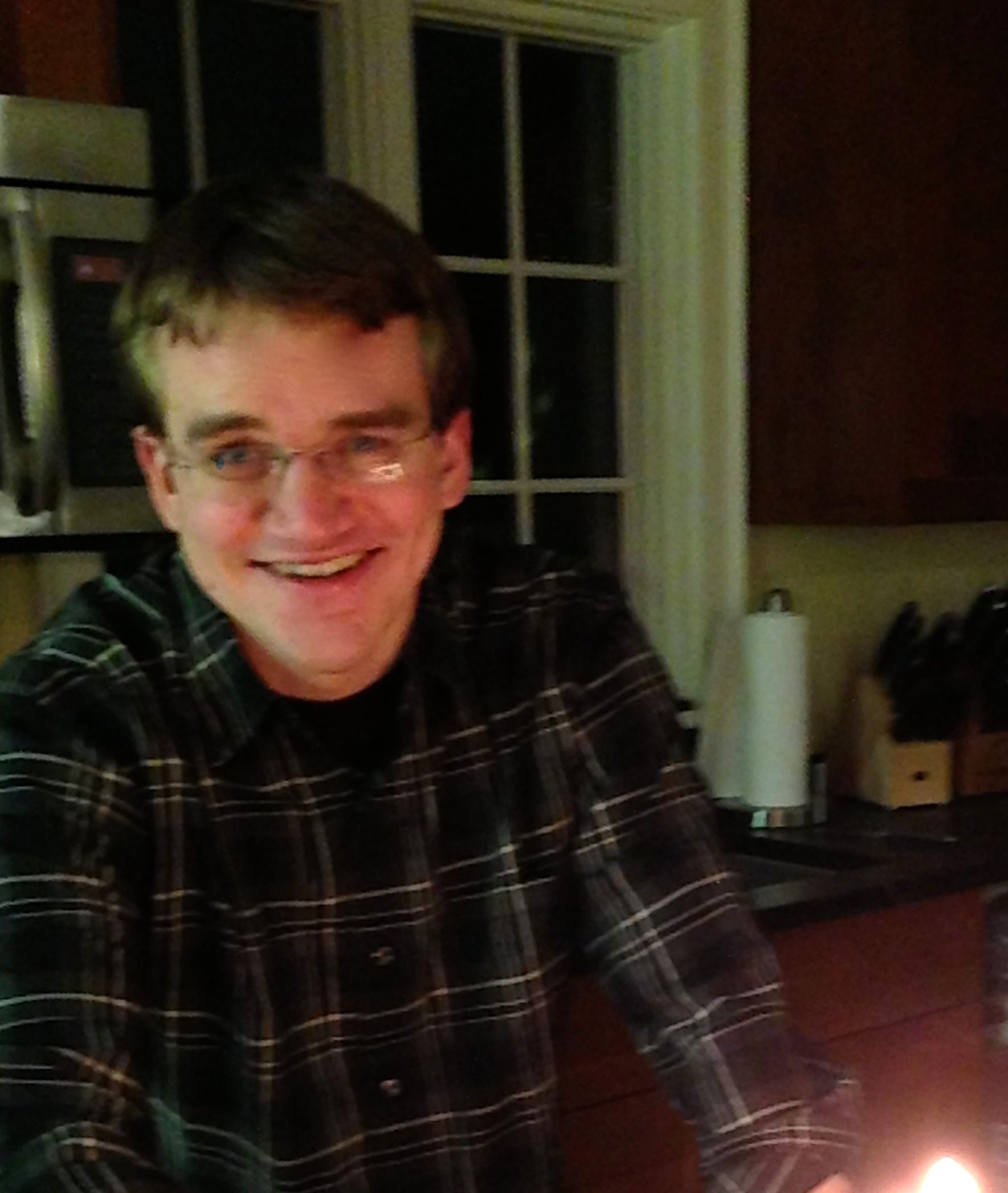
by Deva Jones | Sep 23, 2014 | Internship, Young Adult
This post was written by Josh Leach, seminary intern for UUCSJ.
Hi! My name is Josh Leach and I’m excited to be joining UUCSJ this year as a ministerial intern. I’ll be helping to add to our existing Study Guide and curricular materials, to build a networking platform for our program alums, and to assist with the new SALT program we’re helping to launch in partnership with UU Mass Action. I have a cubicle on the third floor, the walls of which render me invisible to passers-by, but please don’t let that stop you from seeking me out if you need anything or want to chat!
I’m coming to UUCSJ as a part of the “field education” component of my Master of Divinity degree, for which I’m studying at Harvard Divinity School. I hope to pursue a career in ordained UU ministry after I graduate, with a focus on advocacy and public witness. Before coming to HDS, I was a college student at the University of Chicago, where I learned a lot about history and developed a healthy impatience with reality.
The call to ministry was a bit of a foregone conclusion for me, I’m afraid. I was born and raised as a committed UU, and grew up attending services at the Horizon Church in Dallas, TX and the UU Church of Sarasota, FL. Both places taught me to have a strong appreciation for the value and, well, distinctiveness of our religious tradition. Whether I was attending a pagan wedding at Horizon in the heart of Bible-belt Texas, or phone-banking in support of marriage equality with other UUCS folks in the midst of conservative Florida, I learned to take pride early on in the fact that ours is still a community of heretics—and that being such a community takes courage.
I’m thrilled to be sharing the next nine months with everyone at UUCSJ and look forward to working together to put UU values into practice in the world. To paraphrase Monty Python, I hope to be convicted on two counts of heresy this year: heresy by thought and heresy by action!

by Deva Jones | Sep 10, 2014 | Environmental Justice, Internship, Religious Professionals
This post was written by Tim DeChristopher, seminary intern for UUCSJ.
I’m Tim DeChristopher, and I’m excited to be joining the team at the UU College of Social Justice. I am currently a student at Harvard Divinity School, where I am pursuing my Masters of Divinity to become a UU minister. My field education project this year will be working with the UUCSJ to help organize Commit2Respond, a joint program with the UUA and the UUSC that will focus on climate justice in the spring of 2015.
Prior to entering Harvard Divinity School, I spent several years working on climate justice with Peaceful Uprising in Salt Lake City, Utah. That organization grew out of my act of civil disobedience of disrupting a Bureau of Land Management oil and gas auction in 2008. I eventually served two years in federal prison for that action, and I was released in April of 2013. That chapter of my life was documented in the film “Bidder70.” I’m still working for climate justice while continually deepening my understanding of the intersectionality of oppressive structures.
This week I’ll be in Fall River, MA supporting two activists who are standing trial for using their lobster boat to blockade a shipment of West Virginia coal from being delivered to the Brayton Point power plant. They will be making the case that they had a necessity to act to prevent the harm of climate change, and Bill McKibben and James Hansen will be taking the stand to help make the case.
The Commit2Respond program will be an effort to unify and propel the work that UUs and congregations are already doing on climate change. As part of the Commit2Respond program, we’re hoping to have a training next summer that launches a Climate Justice Organizers Core of committed and trained activists that are embedded in congregations around the country, and my efforts will be focused on that part of the project. I look forward to bringing the UUCSJ’s focus on social justice into the struggle for climate justice.
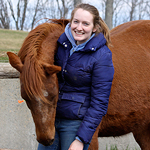
by Heather Vickery | Sep 11, 2013 | Internship, Young Adult
The following post was written by Maris Nyhart, a participant in the Global Justice Summer Internships. A student at Tufts University, Nyhart served as an intern at the Unitarian Universalist Urban Ministry in the Roxbury neighborhood of Boston, Massachusetts.
As my first summer living in Boston and my first summer living on my own, these last few months have certainly been a new adventure. I’ve learned a huge amount in an incredibly short period of time, and have enjoyed the opportunity to explore a city that’s totally new to me, and a far cry from the small town where I grew up. In my internship at the UU Urban Ministry, I’ve gotten not only to learn more about the communities of Boston, but also about outreach and the ways in which a successful nonprofit functions.
While I have been enjoying this new adventure, one of my favorite parts was a day that was surprisingly reminiscent of many summers from my childhood — ones that I was incredibly lucky to be able to spend at camp. A few weeks ago, Monique Veale, director of the Roxbury Youth Programs, took me on a short tour of the camps attended by Roxbury Youth Program participants. We got to watch the children take part in a whole range of camp activities — everything from soccer to pottery to rehearsing for the mini-musical the children performed on the last day.
I think that camps foster a very unique sense of camaraderie. Away from their parents and kids that they’ve gone to school with from a very young age, kids get the opportunity to make new friends as they go through new experiences together. I feel very fortunate to still be in contact with some of the friends I made at camp years ago, and even more fortunate to be able to watch these kids form those same relationships. The day was a nostalgic but welcome flashback.
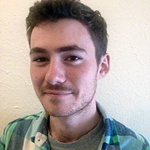
by Heather Vickery | Aug 28, 2013 | Internship, Young Adult
The following post was written by Joe Gayeski, a participant in the Global Justice Summer Internships. A student at University of Edinburgh studying International Relations, Gayeski served as an intern at UUCSJ’s headquarters.
We do a lot of preaching in the United States. If you’re like me and were raised Unitarian Universalist and attended American schools, you’ve heard the sanctity of democracy sermonized in more than one place. From the seven principles of our covenant to the Constitution of our United States, the democratic process is taught as a fundamental virtue. Democracy brings each person’s vote into account, understanding the inherent worth and dignity of every person to include hearing every person’s voice.
We’ve all heard the preaching. But we’re having a lot of trouble practicing.
As an intern at the UUCSJ, I researched the widespread issue of voter suppression. My research identified the measures employed to suppress the vote of minorities, the many states considering such policies, and potential partner organizations addressing the democratic crisis. My research will be the foundation of a future UUCSJ program designed to equip participants with the education and skills to address election justice in their communities. As a Unitarian Universalist, I understood this issue as a dehumanizing attack on the inherent dignity of fellow Americans wishing to participate in our democracy. It was my effort to drive our democracy towards practicing what we preach.
The UUCSJ gave me the opportunity to explore a justice issue and contribute to program development. Furthermore, I assisted with the National Youth Justice Training, explored online advertisement, and gained an understanding of cross-cultural competency. UUCSJ is an organization dedicated to bringing social justice education and skills to UU’s and beyond of any age. If you’ve been looking for a chance to learn first-hand about a social justice issue and how to equip yourself to bring the work home, look no further. Learn with us. Let’s practice what we preach.
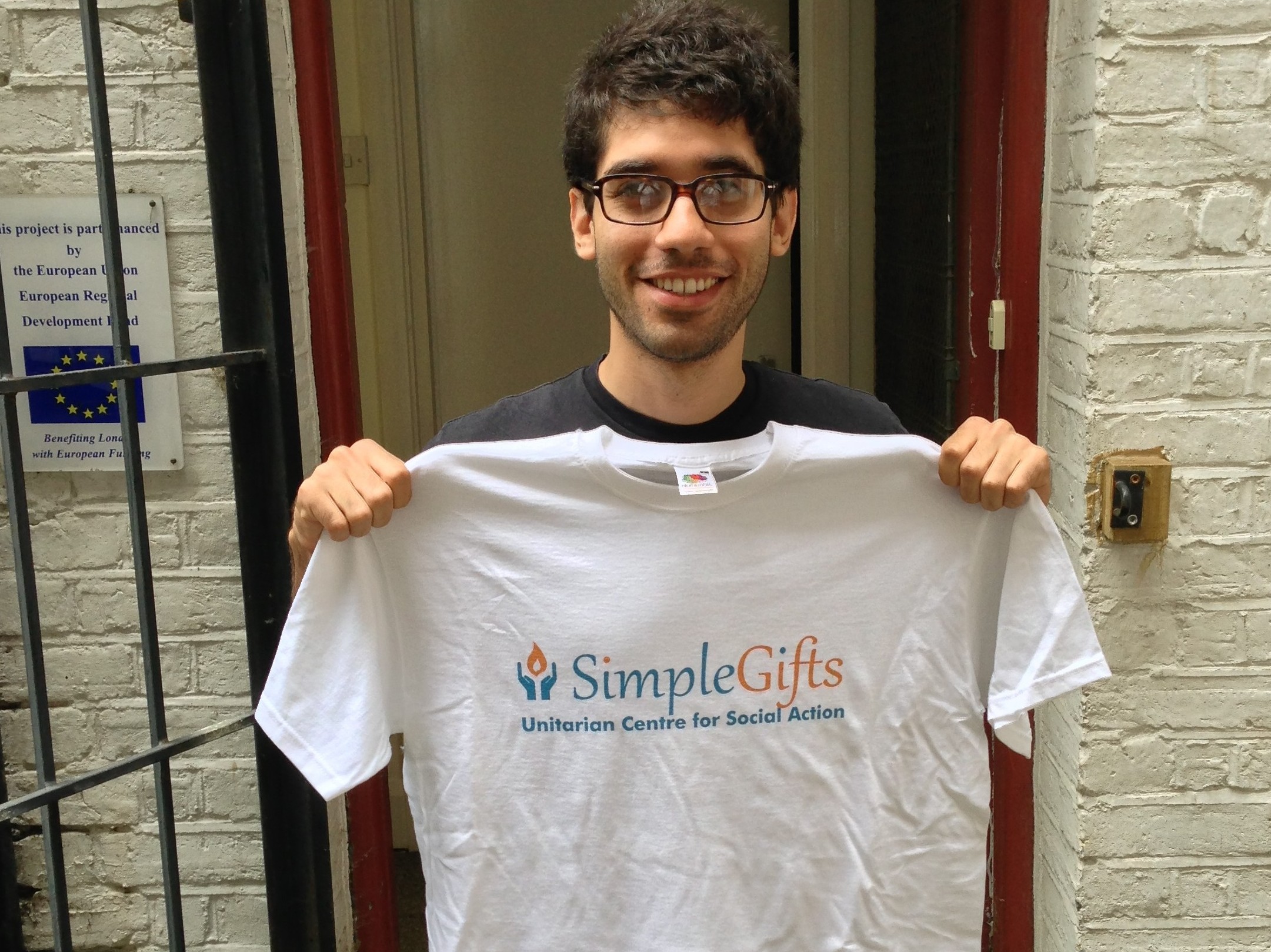
by Heather Vickery | Aug 22, 2013 | Internship, Young Adult
The following post was written by Michael Hassin, a participant in the Global Justice Summer Internships. A student at the College of New Jersey studying economics, Hassin interned this summer with SimpleGifts Unitarian Centre for Social Action in London, England.
Working at SimpleGifts has been an intense, high-speed ride that’s as fun as it is eye-opening. Even just the location is incredible — I got to witness historic London, Bethnal Green, and Bricklane (in a guided tour led by Program Director Rob’s friend Paul, no less), discover London’s museums, wander its parks, explore its streets and pubs and music and comedy. The rich history that the city’s steeped in lends it a sort of gravity that’s tangible. London was an experience in and of itself, and the city left such an impression on me that I think I’ll be applying to work here when I graduate from university.
Work itself showed me what the inside of a charity actually looks like — and a very small, newly started-up one at that. I learned that the world is saved not in one fell swoop, but one e-mail at a time, whether it’s asking universities in the area for volunteers or asking the table tennis coach at a nearby school for help in setting up a league in for our weekly after-school club. Working (well, playing) with the kids during the club is a blast, and their parents are a source of fascinating immigration stories. One week I got the chance to act as translator and speak in Spanish with a woman from Barcelona who had recently moved to London with her Bangladeshi husband. I enjoyed the chance to practice my Spanish, and she was very glad to be able to speak her native language with someone else in London.
As a non-Unitarian, I also found myself in the midst of a community of unconditionally compassionate and accepting people. A forum on the topic of class in a Unitarian church one Saturday showed me how diverse and full of perspectives the Unitarian community is and allowed me to share my own thoughts. And through SimpleGifts, I also met, talked, and worked with some pretty extraordinary folks, including a project leaders from Quaker Social Action and from Praxis, a charity aimed at providing legal advice and other assistance to low-income immigrants — not to mention the members of the SimpleGifts steering committee. Everyone I met was committed to their cause with an inspiring amount of energy.
The experience that left me with the strongest impression was, I think, the day I spent volunteering at the Hackney Migrant Centre, which once a week provides free meals, English lessons, and advice about immigration, housing, employment, and benefits to migrants in need, and where Nic and I helped prepare and serve food. It was heartwarming to see so many people put so much effort into assisting the extraordinarily unfortunate, and it was also daunting to get a glimpse of just how much work there is to be done — not just getting people out of trouble, but fixing the system that lets them get into trouble in the first place. This is, of course, no simple task and requires lifelong patience and persistence that my time here has helped me continue to cultivate.






